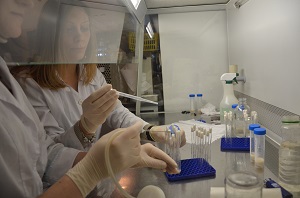MSU microbiologists identify 100 oil decomposing microorganisms suitable for use in Northern seas

Under a contract with Rosneft to create a microbial medication for northern seas signed in 2014, scientists of Moscow State University’s biological faculty have identified about 100 microorganisms able to decompose oil and petroleum products at low temperatures including below zero ones. Over one year, more than 250 samples of water have been tested in Russia’s major northern ports, as well as by the shoreline of northern cities like Murmansk, Vladivostok, Petropavlovsk Kamchatsky, etc. As a result, the scientists have discovered that it had taken a long time for the microorganisms to adapt, yet now they use petroleum products as food. The study has used bacterium which adapted to oil pollution in a natural way, which is why they are totally environmentally friendly.
Specialists from Moscow State University have also developed methods to stepwise select microorganisms that are most active against oil fractions and thus most suitable. Strains of microorganisms with highest target activity have been deposited in the Russian National Collection of Industrial Microorganisms. Currently, the scientists have prepared applications to patent microorganisms and complex biological medication to clean the coastal zone of northern seas from possible contamination with oil and oil products.
The solution is intended to utilize possible oil pollutants in seas, on coastlines and surfaces of ships and platforms. The decomposer is based on psychrophilic bacterium able to absorb oil as a food substrate and turn pollutants into carbon dioxide, water and biomass produced by the bacterium.
White Sea Biological Station of the Moscow State University is currently testing the selected microorganisms and consortia. Operating year-round, the arctic study area enables scientists to conduct microorganisms tests in natural conditions of the northern seas authentically simulated in a flow-through marine aquarium. This method could result in developing a whole range of products to dispose of various types of possible contamination.
The study will result in the creation of safe microbial agents effectively decomposing oil and oil products at low temperatures.
Rosneft
Information Division,
October 16, 2015